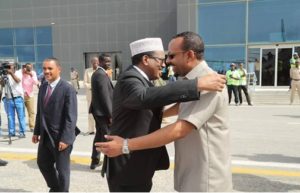By Mahad Gelle
Prime Minister Abiy Ahmed of Ethiopia paid a surprise day–visit to Somalia and his unannounced bilateral discussions, the first by any Ethiopian leadership, was the talk of investment of Somalia ports and road connectivity that would link Somalia to landlocked Ethiopia.

During the visit, the Somali President and visiting Ethiopian Prime Minister shared to the public a joint communiqué—a partnership on joint investment in four key Somali ports, as well as plans for economic integration through inland and expanding linkages to connect Somalia ports to Ethiopia. This deal, between the the two former rival countries, Somalia and Ethiopia breaks the tradition of state visit and bilateral agreements, which require an advance preparation and experts to lead the bilateral discussions from both the hosting and visiting leader.
This is the first time in history that an Ethiopian leader has been on a bilateral visit to Somalia where the only focus of the discussion was on economy topics rather than thorny political issues. The secrecy of Ethiopian Prime Minister’s visit and the reporting restrictions are a testament to how the Somali public and the Somali Federal Institutions (including both Somali Federal Parliamentary Houses–the Lower House and Senate) learned the visit from the arrival of the Ethiopian delegations in Mogadishu.
Ethiopian Media on the Visit
Ethiopian media, especially newspapers, are considered weapons to spread sensationalism and ultra–nationalism of Ethiopia’s foreign policies. But this time they chose not to cover the Ethiopian delegation to Mogadishu–particularly the two top Ethiopian daily newspapers the reporter and Addis Fortune. Rather they covered greatly the visit of the crown prince of the United Arab Emirates (UAE) in Addis Ababa. Ethiopian Prime Minister not only he received the Emirati delegations at the airport, but he ensured to take them out from the airport to their hotel
While the Ethiopian Prime Minister and his delegations were in Mogadishu, the Emirati Crown Prince and his large entourage were eagerly waiting the outcome of Somalia and Ethiopia discussions in Mogadishu, to accelerate the Dubai and Addis Ababa interests on Somalia ports.
President Farmajo came to power riding on a wave of nationalist sentiments and promising to diversify Somalia foreign policy and national interest. Every country places importance on its national interests. Therefore, the national interest of Somalia would be best served if Farmajo kept his promise and expedited trade, transit and connectivity with Ethiopia in a manner that works to the best interest of Somalia.

What is it about Ethiopia’s behaviour that Somalis dislike?
1) Imperial attitude
Majority of Somali citizens feel that Ethiopia holds an “imperial attitude” towards Somalia and interferes in its internal affairs. Time and again, Ethiopia is accused of utilizing diplomatic power for its vested interests. A case in point is the recent “illegal Berbera and Bosaso ports deals” by the United Arab Emirates where Ethiopia acquired nearly 20 percent share deal.
Hours before the Ethiopian Prime Minister’s visit to Somalia, he was hosting his first reciprocal state visit by Mohammad bin Zayed Al Nahyan of United Arab Emirates and the headlines of that visit was much brighter than the one of Somalia since it was titled $3 Billion, laughter!
2) No respect for sovereignty
Somali people are angry that Somali leaders find it necessary to consult Ethiopia on every important matter including its internal issues and national interest.
For the past two decades, Ethiopia has always had political and security influence in Somalia. This changed the geopolitical dynamics of Somalia such that it gave Ethiopia to expand the presence of its troops into various strategic locations within Somalia.
3) “Unfair” treaties
There exists a long history of treaties, which are considered unfair by the Somali people. This list includes the 1948 British Government handover—a big portion and an important Somali pastoral land that was presumably ‘protected’ by British treaties with the Somalis in 1884 and 1886—to Ethiopia, based on a treaty they signed in 1897 in which the British ceded Somali territory to the Ethiopian Emperor Menelik in exchange for his help against Somali raids.
Britain included the proviso that the Somali inhabitants would retain their autonomy, but Ethiopia immediately claimed sovereignty over the area. This prompted an unsuccessful bid by Britain in 1956 to buy back the Somali lands it had turned over.
4) Relationship and rival interests: Turkey, Qatar, UAE and Ethiopia
Geo-strategic significance has always been an important factor in shaping the destiny of a country. Somalia has been well known for its strategic location and natural resource base in the world and Somalia has also been drawing the attention of world powers.
Because of a long border and the ease of cross-border connectivity, Ethiopia asymmetrically needs Somalia for trade and economic connectivity but the question is ‘‘on what terms’’? Somalia would surely benefit if United Arab Emirates and Ethiopia one side and Qatar with Turkey on the other side maintained friendly relations with each other and assisted in Somalia’s quest for economic development after decades of political instability.
Conclusion
From the above description it is clear that Somalia’s position has become strategically more important in the Horn of Africa region. Situated between Ethiopia, Kenya and the Middle East, Somalia can become a heart of geopolitical competition between the rising East African countries and a defensive Arab world.
The biggest question, however, is whether the Farmajo government will move ahead with implementing the joint agreement with Ethiopia’s Prime Minister or if Ethiopia will give concessions to Farmajo in hopes of delaying the influence of Qatar and Turkey in Mogadishu. United Arab Emirates would ideally want the second scenario to unfold, but it would be in the best interests of Somalia if it moved ahead with diversifying its connectivity and transit options with only Somalia’s national interest terms and conditions not the vice–versa.
Mahad Gelle
Email: [email protected]
We welcome the submission of all articles for possible publication on WardheerNews.com. WardheerNews will only consider articles sent exclusively. Please email your article today . Opinions expressed in this article are those of the author and do not necessarily reflect the views of WardheerNews.
WardheerNew’s tolerance platform is engaging with diversity of opinion, political ideology and self-expression. Tolerance is a necessary ingredient for creativity and civility.Tolerance fuels tenacity and audacity.
WardheerNews waxay tixgelin gaara siinaysaa maqaaladaha sida gaarka ah loogu soo diro ee aan lagu daabicin goobo kale. Maqaalkani wuxuu ka turjumayaa aragtida Qoraaga loomana fasiran karo tan WardheerNews.
Copyright © 2024 WardheerNews, All rights reserved


